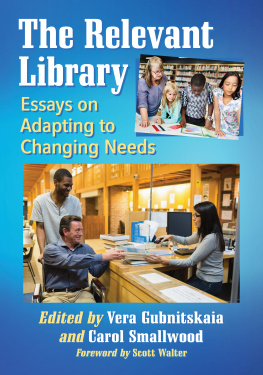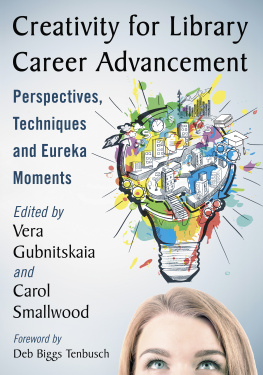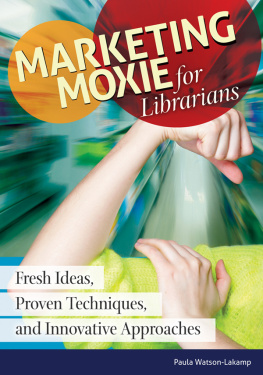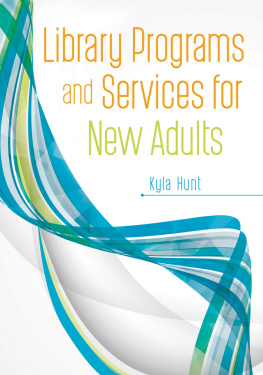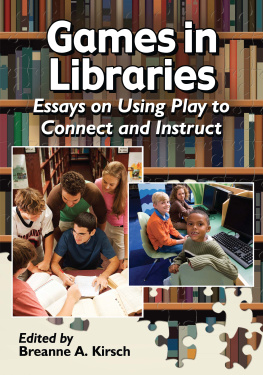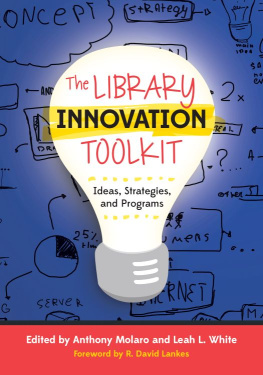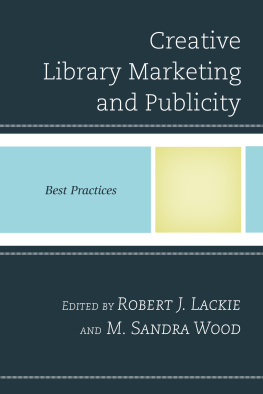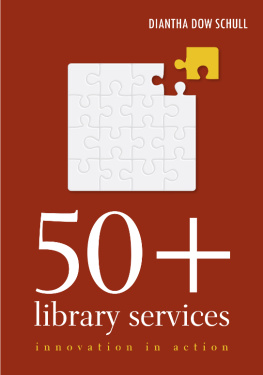
The Relevant Library
Essays on Adapting to Changing Needs
Edited by VERA GUBNITSKAIA and CAROL SMALLWOOD
Foreword by Scott Walter

McFarland & Company, Inc., Publishers
Jefferson, North Carolina
RECENT MCFARLAND WORKS WITH CAROL SMALLWOOD
AND VERA GUBNITSKAIA AND OTHERS
Genealogy and the Librarian, edited by Carol Smallwood and Vera Gubnitskaia (2018)
Teaching Technology in Libraries, edited by Carol Smallwood and Lura Sanborn (2017)
Library Partnerships with Writers and Poets, edited by Carol Smallwood and Vera Gubnitskaia (2017)
Library Volunteers Welcome!, edited by Carol Smallwood and Lura Sanborn (2016)
Continuing Education for Librarians, edited by Carol Smallwood, Kerol Harrod and Vera Gubnitskaia (2013)
Job Stress and the Librarian, edited by Carol Smallwood and Linda Burkey Wade (2013)
Marketing Your Library, edited by Carol Smallwood, Vera Gubnitskaia and Kerol Harrod (2012)
Mentoring in Librarianship, edited by Carol Smallwood and Rebecca Tolley-Stokes (2012);
Women on Poetry, edited by Carol Smallwood, S. Harris and Cynthia Brackett-Vincent (2012)
LIBRARY OF CONGRESS CATALOGUING DATA ARE AVAILABLE
BRITISH LIBRARY CATALOGUING DATA ARE AVAILABLE
e-ISBN: 978-1-4766-3317-6
2018 Vera Gubnitskaia and Carol Smallwood. All rights reserved
No part of this book may be reproduced or transmitted in any form or by any means, electronic or mechanical, including photocopying or recording, or by any information storage and retrieval system, without permission in writing from the publisher.
Front cover image 2018 Wavebreak/iStock; inset 2018 Rawpixel/iStock
McFarland & Company, Inc., Publishers
Box 611, Jefferson, North Carolina 28640
www.mcfarlandpub.com
Foreword
SCOTT WALTER
There are few words that epitomize the current moment in our thinking about libraries like relevance. We may refer to value in academic libraries, following the language employed by Oakleaf (2010) and the Association of College and Research Libraries (201417), or to return on investment in public libraries and special libraries (e.g., Wilson 2016), but the fundamental question for todays librarians is relevance. In todays swiftly changing information age, are libraries still relevant in the lives of their communities and does our work still matter?
In recent years, the Pew Research Center (e.g., Horrigan 2016) has done important work uncovering the place that public libraries still hold in the lives of their communities and the relevance that libraries and librarians have in terms of public concerns about access to information, technology, and educational opportunities. Similar efforts by the Association of College and Research Libraries (201217) have focused on the impact of libraries on student success, just as the American Association of School Librarians has focused on how school libraries transform learning (American Libraries 2014). Libraries of all types have focused attention over the past several years on efforts to explore, document, and communicate both their enduring value to their communities as well as the ways in which broader changes in information, technology, and society may make their work even more important. As this volume was being prepared, for example, public concern over fake news was growing, and libraries of all types were busily engaged with community members to discuss how libraries can help to address what is now recognized as a potential threat to informed democracy in the United States (Banks 2016). At a very basic level, there is plenty of evidence to suggest that the answer to the question of whether libraries are relevant in the lives of their users today is Now, more than ever!
This collection provides a ground-level view of the ways in which libraries of all types are taking advantage of the opportunity to demonstrate their continuing relevance to their communities through a wide variety of programs. Focused, at times, on the ways in which changes in the information enterprise provide new opportunities for partnerships with colleagues on campus or in the community, and, at times, on the ways in which libraries are moving into newly relevant areas of service, this collection provides lessons for readers in almost any type of library for thinking creatively about how to demonstrate their continuing relevance in the lives of their users.
While libraries of different types have come to the question of relevance along different paths, and our view of the work being done by librarians across the country to address this fundamental concern is sometimes fragmented by the different terms used in various parts of our field, this collection is notable for the way in which it brings voices together from a wide variety of libraries to show that there is much in common with the work we are doing and much that we can learn from one another. Eminently practical, the programs presented in this collection will immediately spark ideas in its readers about how similar programs and partnerships might be explored locally.
REFERENCES
American Libraries [Digital Supplement on School Libraries]. September/October 2014. Available at: http://edition.pagesuite-professional.co.uk/html5/reader/production/default.aspx?pubname=&edid=6c7cb940-d8fb-43d88ad8864bf0e83f38 (accessed 6 August 2017).
Association of College & Research Libraries. 20122017. Assessment in Action: Academic Libraries and Student Success. Available at: http://www.ala.org/acrl/AiA (accessed 18 July 2017).
Association of College & Research Libraries. 20142017. ACRL Value of Academic Libraries. Available at: http://www.acrl.ala.org/value/ (accessed 18 July 2017).
Banks, M. 2016. Fighting Fake News. American Libraries, December 27. Available at: https://americanlibrariesmagazine.org/2016/12/27/fighting-fake-news/ (accessed 7 August 2017).
Horrigan, J.B. 2016. Libraries 2016, September 9. Available at http://www.pewinternet.org/2016/09/09/libraries-2016/ (accessed 6 August 2017).
Oakleaf, M. 2010. The Value of Academic Libraries: A Comprehensive Research Review and Report. Chicago: Association of College & Research Libraries. Available at: http://www.ala.org/acrl/sites/ala.org.acrl/files/content/issues/value/val_report.pdf (accessed 20 July 2017).
Wilson, P. 2016. Demonstrating the Librarys ROI. Public Libraries Online, July 12. Available at: http://publiclibrariesonline.org/2016/07/demonstrating-the-librarys-roi/ (accessed 6 August 2017).
Scott Walter is the university librarian at DePaul University and an adjunct member of the faculty of the San Jose State University School of Information and the Dominican University School of Information Studies. A member of the board of directors of Chicago Collections, he has served in leadership positions in the American Library Association.
Preface
VERA GUBNITSKAIA and CAROL SMALLWOOD
For decades, librarians have been discussing the effects of the changing world on the future of their profession. Every development in information retrieval and delivery, such as the emergence of motion pictures, radio, television, and digital media, has raised speculation about the survival and the future of libraries. It has increased with the overwhelming impact of the World Wide Web and easy computer access. The 57 contributors to this collection offer librarians (public, academic, special, school, library faculty and trustees) and others concerned about library relevancy a cross-section of these discussions, providing a variety of samples of innovative projects carried out by and issues confronted by library professionals across the United States.
Next page
